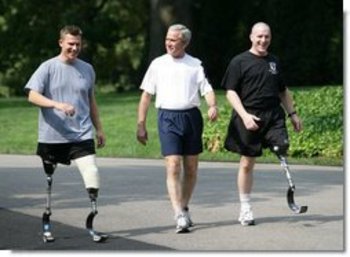Sampling size: two
The other 30% of the soldiers got blown off in Afghanistan and Iraq.
More from the White House photo-op:
THE PRESIDENT: I’ve been running with Max and Allen — I mean, Neil. I met these guys at Walter Reed. Neil lost both legs, and he told me he’s going to run with me on the South Lawn of the White House. Max lost his leg, and he told me he was going to be jumping out of airplanes with the 101st Airborne.
***
Q How does it feel to be with the Commander-in-Chief running around the track?
SERGEANT DUNCAN: Fantastic. It’s an accomplishment. It’s like the pinnacle of recovery, I think. Being a wounded vet, coming of Afghanistan a little over a year-and-a-half ago, being here, running around this track is just amazing. I couldn’t ask for anything better.
THE PRESIDENT: Don’t ask him why he outran me.
Q Why did he outrun you?
THE PRESIDENT: Because he’s a faster runner. Anyway, thank you guys. It’s a proud moment for me, a proud moment.
What the News & Observer says — couldn’t be more true:
One hopes that the administration will go beyond an expression of interest. Bush should move without delay to carry out proposals in the commission’s final report, none of which are overly complicated or costly. Veterans are in need, right now. The Iraq war proceeds. Delay would be unconscionable.
Much of the work that the nine-member commission recommends is common sense and should have been implemented before the rush of casualties began to arrive in military hospitals and on Main Street. For instance, the report calls on the departments of Defense and Veterans Affairs immediately to create comprehensive plans for the wounded, including the care needed, where it should be provided and the proper sequence. It says more needs to be done for service members suffering from post-traumatic stress disorder. The process for granting disability needs reform.
The government needs to provide more support for the families of the wounded. Recent surveys show that two-thirds of injured soldiers have reported that family members or close friends spent extended periods of time with them during their hospitalization. One in five left a job to stay with a wounded service member. Certainly, families shouldn’t suffer financial distress in order to help military casualties heal.


